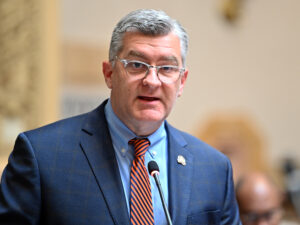Rodney Andrews (Kentucky Lantern photo by Liam Niemeyer)
FRANKFORT — The director of an energy research center at the University of Kentucky told state lawmakers Friday it’s not likely a nuclear power plant will be built in Kentucky over the next 10 years, though some nuclear energy companies are interested in moving to the state.?
A new state law passed by the GOP-dominated legislature this year will make Rodney Andrews, the director of the University of Kentucky Center for Applied Energy Research, the chair of a new research authority aiming to research and promote nuclear energy. The authority, administratively attached to the research center, is required by state law to present a study on workforce and education needs for nuclear energy by December, along with presenting another study by the end of 2025 determining the best locations for nuclear facilities.?
Andrews updated the Interim Natural Resources and Energy Committee on efforts to form the nuclear energy research authority along with another new commission established by lawmakers that creates new barriers to retiring a a fossil fuel-fired power plant. Both the nuclear authority and the power plant retirement review commission are administratively housed at the University of Kentucky’s research center.??
Andrews told lawmakers the state would be “extremely lucky” to see nuclear power within its borders in the next ten years, citing long permitting delays to build new nuclear power plants. Newer nuclear technology such as smaller, modular nuclear power plants have people “very excited,” he said, but no such modular reactors have been built yet.?
He said while the nuclear energy research authority isn’t fully operational yet, conversations have already started with a company that’s interested in locating a “nuclear facility” in Paducah.
“We’re also working with several companies that have expressed a strong interest in exploring bringing nuclear power to the state,” Andrews said. “There’s a great deal of interest among the utilities, but there is also significant interest from some of our largest power consumers.”?
WKMS, the public radio station in Murray, reported earlier this year a land deal was struck in McCracken County for a company seeking to use lasers to recycle depleted uranium stores, including uranium “tails” at the former Paducah Gaseous Diffusion Plant in West Kentucky. Andrews declined to offer more details to the Lantern about the company interested in moving to Paducah.?
Kentucky has never had a nuclear power plant. But the Paducah Gaseous Diffusion Plant in West Kentucky produced enriched uranium for the country’s nuclear weapons program and later for commercial nuclear power plants. Maxey Flats in northeastern Kentucky served as a disposal site for low-level radioactive waste during the 20th century. Both installations contaminated surrounding soil and water and required extensive remediation.
Nuclear reactors don’t produce direct greenhouse gas emissions that contribute to climate change. But energy analysts are divided on whether nuclear energy can be developed quickly enough to help reduce greenhouse gas emissions in time to avoid the worst impacts of climate change.
Appointment delays for board creating fossil fuel retirement barriers
Andrews also updated lawmakers on efforts to form the Energy Inventory and Planning Commission, or EPIC, a new agency that utilities would have to come to first when requesting to retire a fossil fuel-fired power plant in the state, such as plants using coal or natural gas.?
Utilities and environmentalists decried the bill establishing EPIC, saying it would result in ratepayers bearing the costs of keeping aging, uneconomical coal-fired power plants on the grid when lower-cost alternatives are available. Critics also said the board’s statutory makeup had pro-industry and pro-fossil fuel biases with little representation for the interests of ratepayers. Proponents of the bill, including Senate President Robert Stivers, argued EPIC was needed to make sure the state’s energy capacity was secure in the face of rising energy demands.?
Andrews, as director of the University of Kentucky Center for Applied Energy Research, would be a part of a five-member executive committee for EPIC alongside members representing utilities and the coal industry. Utilities would have to approach this committee and have a request to retire a fossil fuel-fired power plant analyzed before requesting the retirement before the Kentucky Public Service Commission, the state’s utility regulator that has traditionally analyzed and approved or denied power plant retirements.?
Democratic Gov. Andy Beshear — who echoed the concerns of utilities in vetoing the bill and calling it unconstitutional — is over a month overdue in making appointments to EPIC. The? statutory deadline was July 1.

Sen. Robby Mills, R-Henderson, asked Andrews if the appointments to EPIC were forthcoming or if he was aware of anything that was “holding up” Beshear’s? appointments. Andrews replied the governor’s office had “gotten recommendations” and that the appointments would happen “very quickly.”?
Crystal Staley, a spokesperson for the governor’s office, in a statement to the Lantern in early July said the office was “working on a process that is legal under the Kentucky Constitution” to make the appointments, and that letters seeking nominations had been sent.?
Andrews, speaking with the Lantern after his presentation to lawmakers, said the research center can provide expertise to make sure the “work product is as technically sound as possible” for both the nuclear research authority and the fossil fuel retirement review commission.?
He told lawmakers he was in the “very early” work of building the scope of how EPIC would operate, which includes considering the state’s future power needs, including possibly? trying to attract large energy consumers such as data centers.
GET THE MORNING HEADLINES.